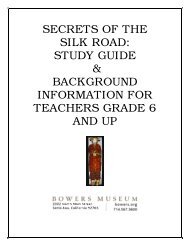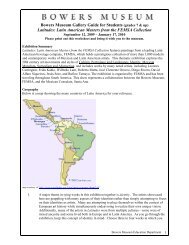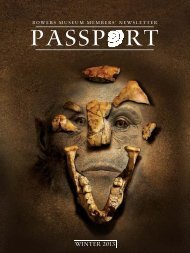A Resource Guide for Students and Teachers - Bowers Museum
A Resource Guide for Students and Teachers - Bowers Museum
A Resource Guide for Students and Teachers - Bowers Museum
You also want an ePaper? Increase the reach of your titles
YUMPU automatically turns print PDFs into web optimized ePapers that Google loves.
Daily Life<br />
in Ancient<br />
China<br />
Details of warriors <strong>and</strong><br />
horses found in the tomb<br />
In ancient China there were<br />
two classes of people, the upper<br />
class <strong>and</strong> the lower class, <strong>and</strong> a<br />
hierarchy existed within each.<br />
The upper class consisted of the<br />
emperor <strong>and</strong> his family, government<br />
officials, scholars who were not<br />
rich but were respected <strong>for</strong> their<br />
knowledge, <strong>and</strong> the l<strong>and</strong>-owning<br />
gentry who had l<strong>and</strong> they could rent<br />
to others. Those in the upper class<br />
lived in wooden houses with a tiled<br />
roof. The emperor was the wealthiest<br />
of the upper class, <strong>and</strong> the rich<br />
ate well <strong>and</strong> wore silk. The skill of<br />
making silk was a secret kept by the<br />
Chinese <strong>for</strong> centuries. Both men <strong>and</strong><br />
women wore robes with sashes <strong>and</strong><br />
wealthy women wore silk slippers.<br />
The lower class consisted of<br />
soldiers, merchants, <strong>and</strong> peasants.<br />
Although generals were respected,<br />
soldiers were in the lower class<br />
because they were sent to fight <strong>and</strong><br />
die. Merchants were looked down on<br />
because they sold things others had<br />
made. The peasants usually worked<br />
the gentry’s l<strong>and</strong> <strong>and</strong> remained in<br />
poverty due to high taxes. The lower<br />
class lived in houses made of mud<br />
<strong>and</strong> straw.<br />
Few of the poor could read or<br />
write. They did not own their own<br />
l<strong>and</strong>, <strong>and</strong> some families were so poor<br />
they sold their daughters to the rich<br />
as servants. Farmers did not keep the<br />
majority of their crops; the crops were<br />
used to feed others. The men wore<br />
baggy pants <strong>and</strong> a cotton shirt. All<br />
shoes were made of straw. The poor<br />
people’s diet included wheat noodles,<br />
rice, steamed bread or bean curd.<br />
Meat was rare. Workers per<strong>for</strong>med<br />
most jobs by h<strong>and</strong>, spending long<br />
hours doing manual labor.<br />
The First Emperor <strong>for</strong>ced his<br />
subjects into occupations which he<br />
chose. He felt the only productive<br />
occupations were agriculture <strong>and</strong><br />
the military. A few individuals were<br />
needed as bureaucrats to carry out<br />
the management of these people. He<br />
felt that all other occupations such as<br />
merchants <strong>and</strong> intellectuals had no<br />
value in society. Qin did not believe<br />
in education <strong>for</strong> the common man<br />
because it would take time away from<br />
farming. If workers were too slow or<br />
tried to do something different, they<br />
were put to work on the great wall.<br />
19





